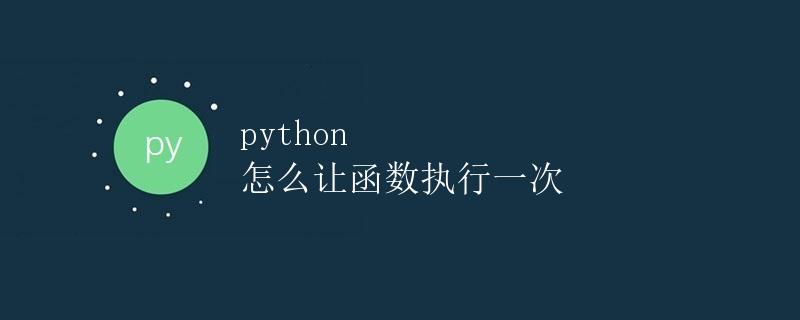Python 怎么让函数执行一次

在编写Python程序时,有时候我们会遇到需要让某个函数只执行一次的情况。可能是因为函数会对全局变量进行修改,而我们只想让它执行一次,或者是为了避免重复执行造成不必要的性能消耗。本文将介绍几种方法来实现让函数执行一次的功能。
方法一:使用全局变量控制执行次数
这种方法比较简单,我们可以使用一个全局变量作为标记,判断是否已经执行过函数。如果已经执行过,则不再执行。
def some_function():
global executed
if not executed:
print("Function executed!")
executed = True
executed = False
some_function()
some_function()
运行结果:
Function executed!
方法二:使用装饰器
装饰器是Python中的一种高级功能,可以在不修改原函数代码的情况下增加额外的功能。我们可以编写一个装饰器函数,在其中判断函数是否已经执行过,如果执行过则不再执行。
def execute_once(func):
def wrapper(*args, **kwargs):
if not wrapper.executed:
func(*args, **kwargs)
wrapper.executed = True
wrapper.executed = False
return wrapper
@execute_once
def some_function():
print("Function executed!")
some_function()
some_function()
运行结果:
Function executed!
方法三:使用闭包
闭包是函数式编程中的一个重要概念,可以使得函数可以记住其创建时的环境。我们可以定义一个外部函数,在其中判断是否执行过,并返回一个内部函数。
def execute_once(func):
executed = [False]
def wrapper(*args, **kwargs):
if not executed[0]:
func(*args, **kwargs)
executed[0] = True
return wrapper
def some_function():
print("Function executed!")
some_function = execute_once(some_function)
some_function()
some_function()
运行结果:
Function executed!
通过以上三种方法,我们可以很容易地实现让函数只执行一次的功能。根据实际情况选择合适的方法,可以让我们的代码更加简洁和高效。
 极客教程
极客教程